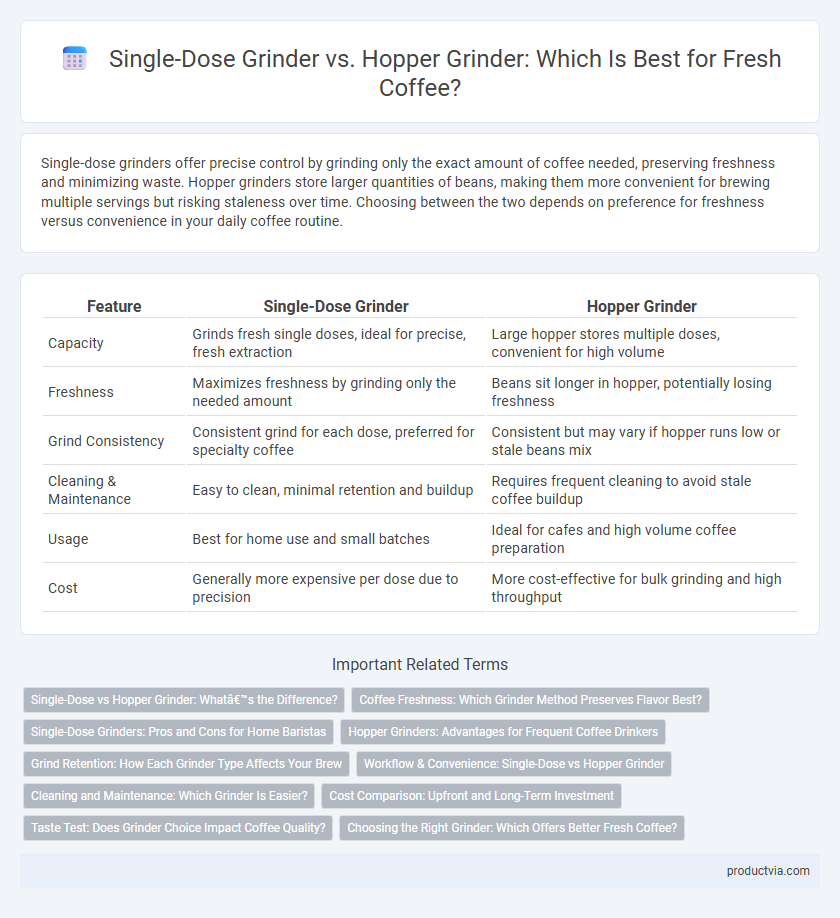Single-dose grinders offer precise control by grinding only the exact amount of coffee needed, preserving freshness and minimizing waste. Hopper grinders store larger quantities of beans, making them more convenient for brewing multiple servings but risking staleness over time. Choosing between the two depends on preference for freshness versus convenience in your daily coffee routine.
Table of Comparison
| Feature | Single-Dose Grinder | Hopper Grinder |
|---|---|---|
| Capacity | Grinds fresh single doses, ideal for precise, fresh extraction | Large hopper stores multiple doses, convenient for high volume |
| Freshness | Maximizes freshness by grinding only the needed amount | Beans sit longer in hopper, potentially losing freshness |
| Grind Consistency | Consistent grind for each dose, preferred for specialty coffee | Consistent but may vary if hopper runs low or stale beans mix |
| Cleaning & Maintenance | Easy to clean, minimal retention and buildup | Requires frequent cleaning to avoid stale coffee buildup |
| Usage | Best for home use and small batches | Ideal for cafes and high volume coffee preparation |
| Cost | Generally more expensive per dose due to precision | More cost-effective for bulk grinding and high throughput |
Single-Dose vs Hopper Grinder: What’s the Difference?
Single-dose grinders are designed to grind coffee beans one batch at a time, minimizing exposure to air and preserving freshness, making them ideal for those who prefer precise control over each brew. Hopper grinders store a larger quantity of beans in a hopper, allowing for continuous grinding but potentially compromising freshness due to prolonged air exposure. Choosing between single-dose and hopper grinders hinges on balancing convenience with optimal coffee freshness and flavor extraction.
Coffee Freshness: Which Grinder Method Preserves Flavor Best?
Single-dose grinders preserve coffee freshness by grinding only the amount needed for each brew, minimizing exposure to oxygen and reducing flavor degradation. Hopper grinders store larger quantities of beans, exposing them to air and moisture over time, which can lead to staleness and diminished flavor complexity. For optimal flavor retention, single-dose grinding ensures each cup uses freshly ground coffee with maximum aroma and richness.
Single-Dose Grinders: Pros and Cons for Home Baristas
Single-dose grinders offer precise control over grind consistency, minimizing stale coffee by grinding only what's needed for each brew, ideal for home baristas who prefer freshness and variety. They require frequent adjustment and cleaning, which may be time-consuming compared to hopper grinders that hold larger quantities for convenience. Single-dose grinders excel in maintaining peak flavor and aroma by preventing coffee bean degradation, making them a top choice for flavor-focused coffee enthusiasts.
Hopper Grinders: Advantages for Frequent Coffee Drinkers
Hopper grinders store a larger amount of coffee beans, reducing the need for frequent refills and maintaining freshness for multiple brews. Their consistent dose and grind size ensure uniform extraction, enhancing flavor stability for daily coffee enthusiasts. The convenience of quick access and minimal preparation time makes hopper grinders ideal for frequent coffee drinkers seeking efficiency without sacrificing quality.
Grind Retention: How Each Grinder Type Affects Your Brew
Single-dose grinders minimize grind retention by only holding grounds for one use, ensuring fresher coffee with every brew and reducing stale residue buildup. Hopper grinders, designed for larger batches, tend to retain more coffee between uses, which can lead to stale particles mixing with fresh grounds and impacting flavor consistency. Choosing a single-dose grinder enhances purity and freshness by eliminating old grounds, while hopper grinders offer convenience at the expense of potential grind retention issues.
Workflow & Convenience: Single-Dose vs Hopper Grinder
Single-dose grinders eliminate the need to store large amounts of coffee in a hopper, ensuring fresh grinding every time and streamlining workflow for precision-focused baristas. Hopper grinders offer convenience by enabling continuous grinding without frequent refills, ideal for high-volume environments where speed and efficiency are essential. Choosing between single-dose and hopper grinders directly impacts workflow smoothness and operational convenience in coffee preparation.
Cleaning and Maintenance: Which Grinder Is Easier?
Single-dose grinders require frequent cleaning after every use since only one dose is ground at a time, minimizing stale coffee residue buildup and ensuring maximum freshness. Hopper grinders hold larger amounts of beans, reducing the need for constant refilling but accumulating more oils and grounds that can complicate cleaning and maintenance. For ease of cleaning, single-dose grinders are typically preferred due to their simpler design and lower risk of stale coffee contaminating future brews.
Cost Comparison: Upfront and Long-Term Investment
Single-dose grinders typically have a lower upfront cost compared to hopper grinders, making them an attractive choice for casual coffee enthusiasts or those with limited kitchen space. Hopper grinders, while more expensive initially, offer greater capacity and consistency for high-volume use, potentially reducing the cost per cup over time. Considering long-term investment, single-dose grinders minimize coffee waste but may require more frequent maintenance, whereas hopper grinders demand larger initial outlays but benefit from durability and efficiency in commercial or heavy-use scenarios.
Taste Test: Does Grinder Choice Impact Coffee Quality?
Single-dose grinders provide precise coffee grinding tailored for each brew, preserving bean freshness and enhancing flavor clarity in taste tests. Hopper grinders store larger bean quantities, risking oxidation that can diminish coffee quality and create stale notes. Taste comparisons reveal single-dose grinders yield more vibrant, nuanced flavors due to minimized exposure to air and consistent grind size.
Choosing the Right Grinder: Which Offers Better Fresh Coffee?
Single-dose grinders deliver fresher coffee by grinding only the exact amount needed, minimizing exposure to air and preserving the beans' aroma and flavor. Hopper grinders store larger quantities of beans but risk oxidation and staleness, which can degrade coffee quality over time. Choosing a single-dose grinder is ideal for those who prioritize peak freshness and flavor consistency in every cup.
Single-dose grinder vs Hopper grinder for fresh coffee Infographic

 productvia.com
productvia.com